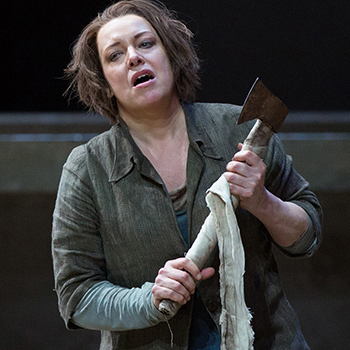 Wednesday October 19 at 8 pm. Elektra, Richard Strauss’s blazing tragedy about an ancient Greek princess hell-bent on revenge comes to Great Performances at the Met. Esa-Pekka Salonen conducts an extraordinary cast headed by Nina Stemme as the obsessed and bloodthirsty title character. Waltraud Meier sings her first Met performances of Klytämnestra, Elektra’s mother and the object of her fury, with Adrianne Pieczonka as Elektra’s sister, Chrysothemis; Eric Owens as her exiled brother, Orest; and German tenor Burkhard Ulrich, in his Met debut, as the corrupt monarch Aegisth.
Wednesday October 19 at 8 pm. Elektra, Richard Strauss’s blazing tragedy about an ancient Greek princess hell-bent on revenge comes to Great Performances at the Met. Esa-Pekka Salonen conducts an extraordinary cast headed by Nina Stemme as the obsessed and bloodthirsty title character. Waltraud Meier sings her first Met performances of Klytämnestra, Elektra’s mother and the object of her fury, with Adrianne Pieczonka as Elektra’s sister, Chrysothemis; Eric Owens as her exiled brother, Orest; and German tenor Burkhard Ulrich, in his Met debut, as the corrupt monarch Aegisth.
Elektra premiered in Dresden in 1909. Shortly after conquering the opera world with his scandalous masterpiece Salome, Richard Strauss turned to a recent adaptation of Sophocles’s Electra by Austrian author Hugo von Hofmannsthal for his next project. The drama unfolds in a single act of rare vocal and orchestral power.
The title role is demanding even by the composer’s daunting standards: Once Elektra takes the stage near the beginning of the opera, she does not leave, portraying a wide spectrum of emotions and singing over an enormous orchestra throughout the course of the work.
Munich-born Richard Strauss (1864–1949) composed an impressive body of orchestral works and songs before turning to opera. After two early failures, the 1905 premiere of Salome caused a theatrical sensation, and the balance of his long career was largely dedicated to music for the stage.
The orchestra for Elektra is often cited as the largest for any repertory opera. It includes eight clarinets, four French horns, four Wagner tubas, seven trumpets, two harps, a huge body of strings, and a substantial percussion section. The score encompasses an astonishing range of musical color: there are moments of sublime lyricism when the characters express tenderness or love, and there is brutal, harsh dissonance when they are at (or beyond) the bounds of sanity.

 Live Radio
Live Radio